The activism of women was impossible to miss during the Progressive Era. From labor strikes and grassroots campaigns to the crusade for the vote, women mobilized in large numbers.

In the New York City garment industry, tens of thousands of Jewish and Italian immigrant women labored in crowded and often dangerous factories and sweatshops. A number of small strikes broke out in October 1909. One young strike leader—Clara Lemlich—made history. She had been advised by male labor leaders to proceed cautiously. Instead, at a mass meeting the following month, she turned the struggle into something much larger. “I am a working girl, one of those who are on strike against intolerable conditions,” she declared, “I offer a resolution that a general strike be declared—now!” The crowd went wild, and a general strike of women garment workers began. From November 1909 to February 1910, between 20,000 and 40,000 women—many of them teenagers—struck their employers. They demanded higher wages, shorter working hours, paid overtime, and union recognition.
Members of the local branch of the International Ladies’ Garment Workers’ Union Local 25 gathered in mass meetings in the evening and marched in picket lines during the day. Their protest was difficult and dangerous. Employers hired thugs and private security guards to harass and beat the strikers. Police often arrested picketers. One account put the number of arrests in the strike’s first month at 771 people.
Law enforcers attacked the strikers’ supporters as well. The Women’s Trade Union League had been formed in 1903 to promote women’s unionization. Middle-class and elite women dominated its membership. When they joined the picket lines in a show of support for working women, their privileged backgrounds didn’t protect them from abuse and arrest. The violence directed against the women strikers and their allies attracted considerable attention in the press.
This story is from the April 2017 edition of Cobblestone American History Magazine for Kids.
Start your 7-day Magzter GOLD free trial to access thousands of curated premium stories, and 9,000+ magazines and newspapers.
Already a subscriber ? Sign In
This story is from the April 2017 edition of Cobblestone American History Magazine for Kids.
Start your 7-day Magzter GOLD free trial to access thousands of curated premium stories, and 9,000+ magazines and newspapers.
Already a subscriber? Sign In

Putting the Pieces Together
Americans needed to begin to put the past behind them, come together, and plan for the future in the spring of 1865. But Abraham Lincoln, the man best equipped to lead them and who had hoped to restore the country as smoothly and peacefully as possible, had been assassinated.

LAST SHOTS
The last Confederate forces in the Civil War didn’t surrender in the spring of 1865 or on a battlefield.
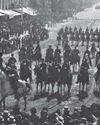
AND IN OTHER 1865 NEWS
A group of African Americans stop at the White House’s annual public reception on January 1, where they shake hands with President Abraham Lincoln.
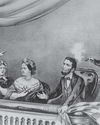
A Plot to Kill President the
For several months, actor John Wilkes Booth’s band of conspirators had plotted to capture President Abraham Lincoln and hold him hostage in exchange for Confederate prisoners.

Let the Thing Be Pressed
In June 1864, Union Lieutenant General Ulysses S. Grant began a nearly 10-month campaign in Virginia.
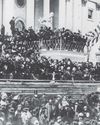
HEALING THE NATION
President Abraham Lincoln took the oath of office for the second time on March 4, 1865.

A Helping Hand
The spring season is hard in any agricultural society. Plants and animals are too small to eat.
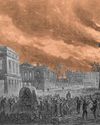
WAR SHERMAN-STYLE
As far as Union Major General William T. Sherman was concerned, the Civil War had gone on long enough.

PEACE TALKS
The fall of Fort Fisher made clear that the Confederacy’s days were numbered. Southerners were tired and hungry.
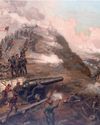
FORT FISHER'S FALL
Outnumbered Confederate soldiers inside Fort Fisher were unable to withstand the approach of Union troops by land and the constant Union naval bombardment from the sea.